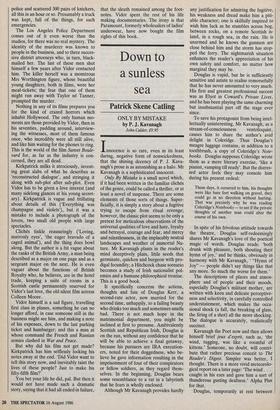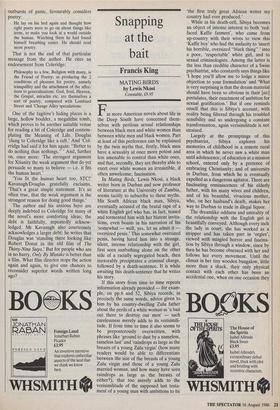Down to a sunless sea
Patrick Skene Catling
ONLY BY MISTAKE by P. J. Kavanagh
John Calder, £9.95
Innocence is so rare, even in its least daring, negative form of nonwickedness, that the shining decency of P. J. Kava- nagh's prose is as astonishing as a halo. Mr Kavanagh is a sophisticated innocent.
Only By Mistake is a small novel which, if it had been written in the familiar clichés of the genre, could be called a thriller, or at least a novel of suspense. There are some elements of those sorts of things. Super- ficially, it is simply a story about a fugitive trying to escape from ritual revenge; however, the classic plot seems to be only a pretext for meticulous observations of the universal qualities of love and hate, loyalty and betrayal, courage and fear, and mercy and relentlessness, in the implacably neutral landscapes and weather of immortal Na- ture. Mr Kavanagh plants in the reader's mind deceptively plain, little seeds that germinate, quicken and burgeon with pro- digal fecundity; a Hitchcock chase scenario becomes a study of Irish nationalist pol- emics and a humane philosophical treatise. This is a good book.
It specifically concerns the actions, thoughts and fate of Douglas Kerr, a second-rate actor, now married for the second time, unhappily, to a failing beauty who drinks too much and sometimes smells bad. There is not much hope in the matrimonial department, you might be inclined at first to presume. Ambivalently Scottish and Republican Irish, Douglas is on the run, without any confidence that he will be able to achieve a final getaway, because his pursuers are IRA execution- ers, noted for their doggedness, who be- lieve he gave information resulting in the imprisonment of four of their conspirators or fellow soldiers, as they regard them- selves. In the beginning, Douglas bears some resemblance to a rat in a labyrinth that he fears is wholly enclosed.
Although Mr Kavanagh provides hardly any justification for admiring the fugitive, his weakness and dread make him a piti- able character; one is skilfully inspired to wish him luck as he stumbles across bog, between rocks, on a remote Scottish is- land, in a rough sea, in the rain. He is unarmed and he knows the gunmen are close behind him and the storm has stop- ped the ferry. The nightmarish situation enhances the reader's appreciation of his own safety and comfort, no matter how marginal they may be.
Douglas is vapid, but he is sufficiently sensitive and astute to realise remorsefully that he has never amounted to very much. His first and greatest professional success was as Elyot in Coward's Private Lives, and he has been playing the same charming but insubstantial part off the stage ever since.
To save his protagonist from being intel- lectually uninteresting, Mr Kavanagh, as a stream-of-consciousness ventriloquist, causes him to share the author's avid delight in Coleridge. Thus Douglas's meagre luggage contains, in addition to a toothbrush, a copy of Coleridge's Note- books. Douglas supposes Coleridge wrote them as a mere literary exercise, 'like a pianist, vamping till ready'. But the distres- sed actor feels they may console him during his present ordeal: These days, it occurred to him, his thoughts were like bare feet walking on gravel, they could go in no direction without hurting. That was precisely why he was reading Coleridge's Notebooks — to see if the private thoughts of another man could alter the course of his own.
In spite of his frivolous attitude towards the theatre, Douglas self-redeemingly shares Mr Kavanagh's love of the poetical magic of words. Douglas reads: 'both drunk with pleasure, both shouting their hymn of joy,' and he thinks, obviously in harmony with Mr Kavanagh, '"Hymn of Joy" — people didn't say things like that any more. So much the worse for them.'
The descriptions of places and atmos- phere and of people and their moods, especially Douglas's militant mother, are written with keen and delicate perceptive- ness and selectivity, in carefully controlled understatement, which makes the occa- sional shock (a fall, the breaking of glass, the firing of a shot) all the more shocking. The dialogue is accurately, realistically succinct.
Kavanagh the Poet now and then allows himself brief jeux d'esprit, such as, 'the wind, tugging, was like a roomful of kittens.' Someone, no doubt, will contri- bute that rather precious conceit to The Reader's Digest. Simpler was better, I thought. There is a more vivid meteorolo- gical report on a later page: 'The wind. . caught in his ears and gave him a sort of thunderous gusting deafness.' Alpha Plus for that.
Douglas, temporarily at rest between outbursts of panic, favourably considers poetry: He lay on his bed again and thought how right poets were to go on about things like terns, to make you look at a world outside the human. Watching them he had found himself breathing easier. He should read more poetry.
That is not the end of that particular message from the author. He cites an endorsement from Coleridge:
Philosophy to a few, Religion with many, is the Friend of Poetry; as producing the 2 conditions of pleasure for poetry, namely tranquillity and the attachment of the affec- tions to generalisations. God, Soul, Heaven, the Gospel, miracles etc. are themselves a sort of poetry, compared with Lombard Street and 'Change Alley speculations.
One of the fugitive's hiding places is a large, hollow boulder, a megalithic tomb, which proves to be another suitable venue for reading a bit of Coleridge and contem- plating the Meaning of Life. Douglas 'clung to Coleridge like a raft.' And 'Col- eridge had said it for him again: "Better to do nothing than nothings."' And, further on, once more: The strongest argument for Xtianity the weak argument that do yet persuade so many to believe — i.e. it fits the human heart.'
'You fit the human heart too, STC!' Kavanagh/Douglas gratefully exclaims. 'That's a great simple statement. It's so often true, that the weak argument is the strongest reason for doing good things.'
The author and his anxious hero are deeply indebted to Coleridge for many of the novel's more comforting ideas; the debt is faithfully, repeatedly acknow- ledged. Mr Kavanagh also courteously acknowledges a larger debt: he writes that Douglas was 'standing there looking like Robert Donat in the old film of The Thirty-Nine Steps.' But for people who are in no hurry, Only By Mistake is better than a film. What film director stops the action again and again, to give one chances to reconsider superior words written long ago?











































 Previous page
Previous page